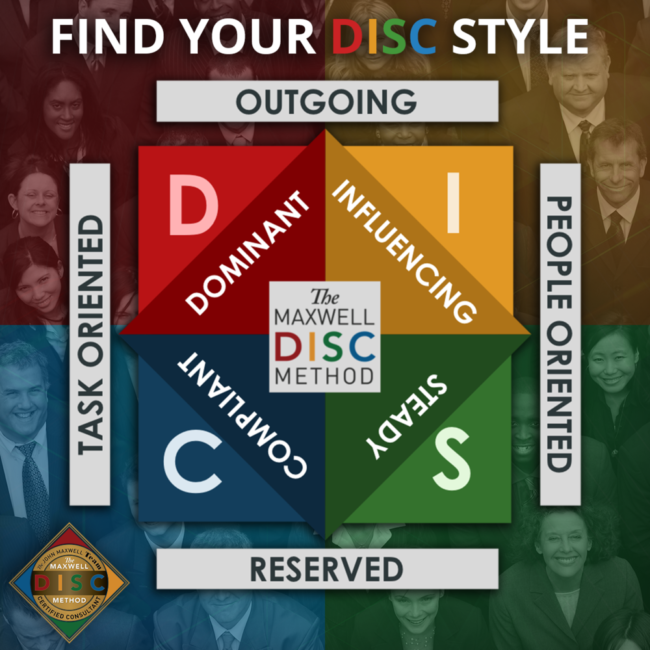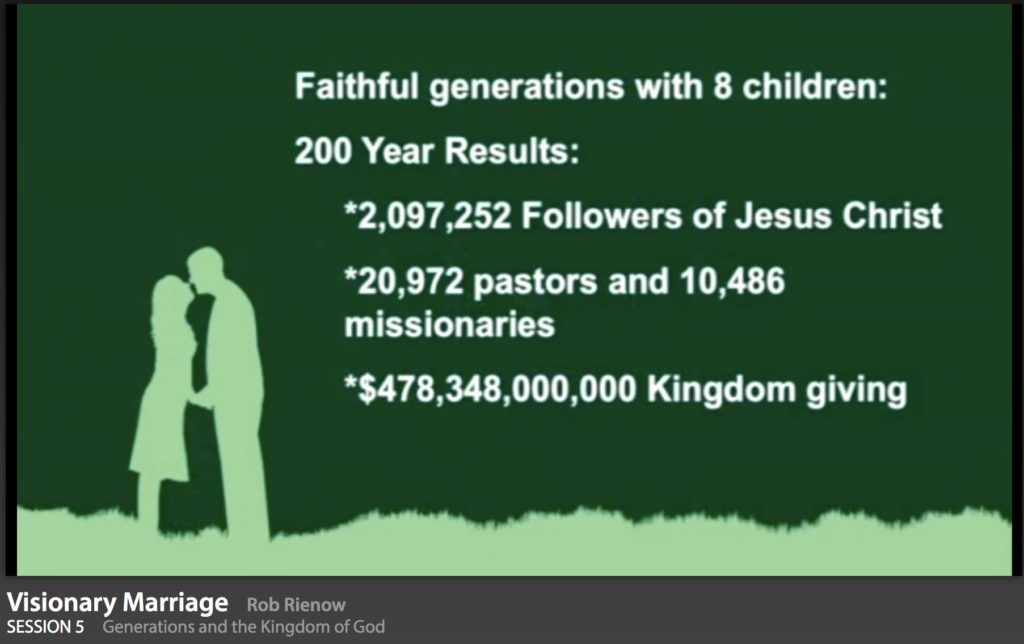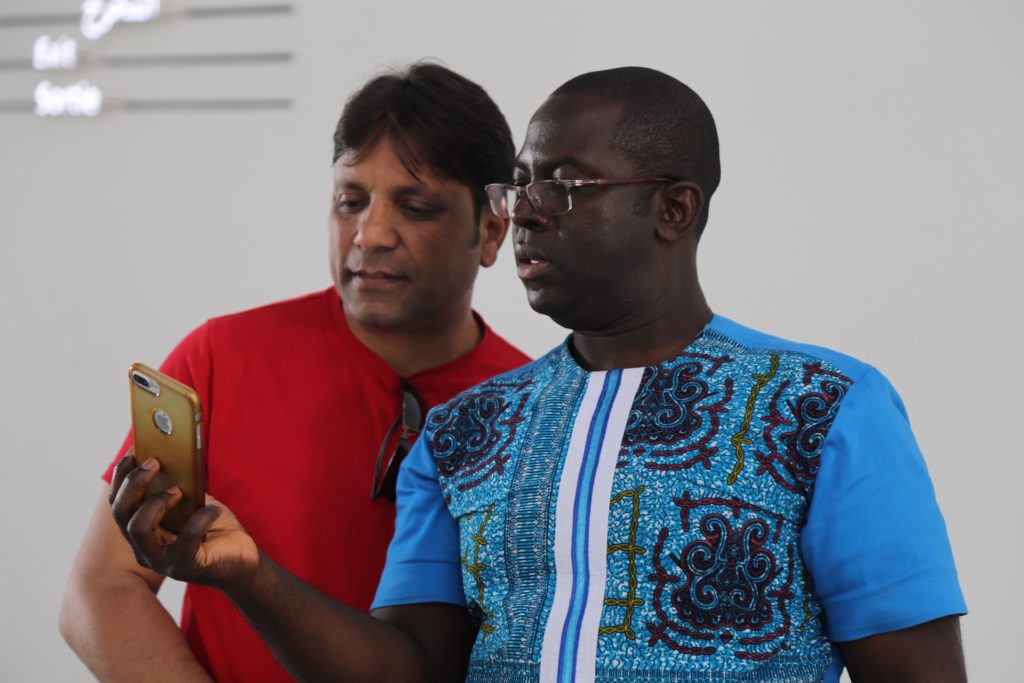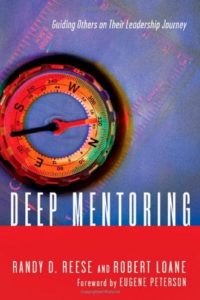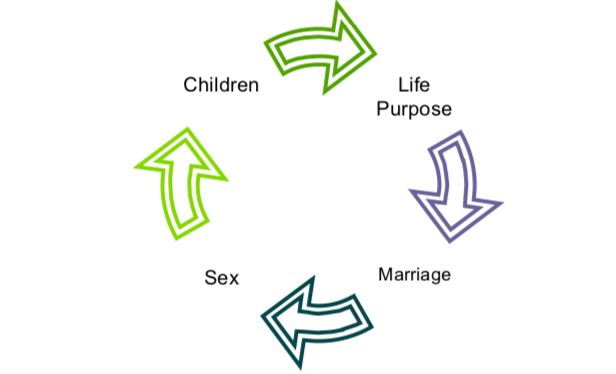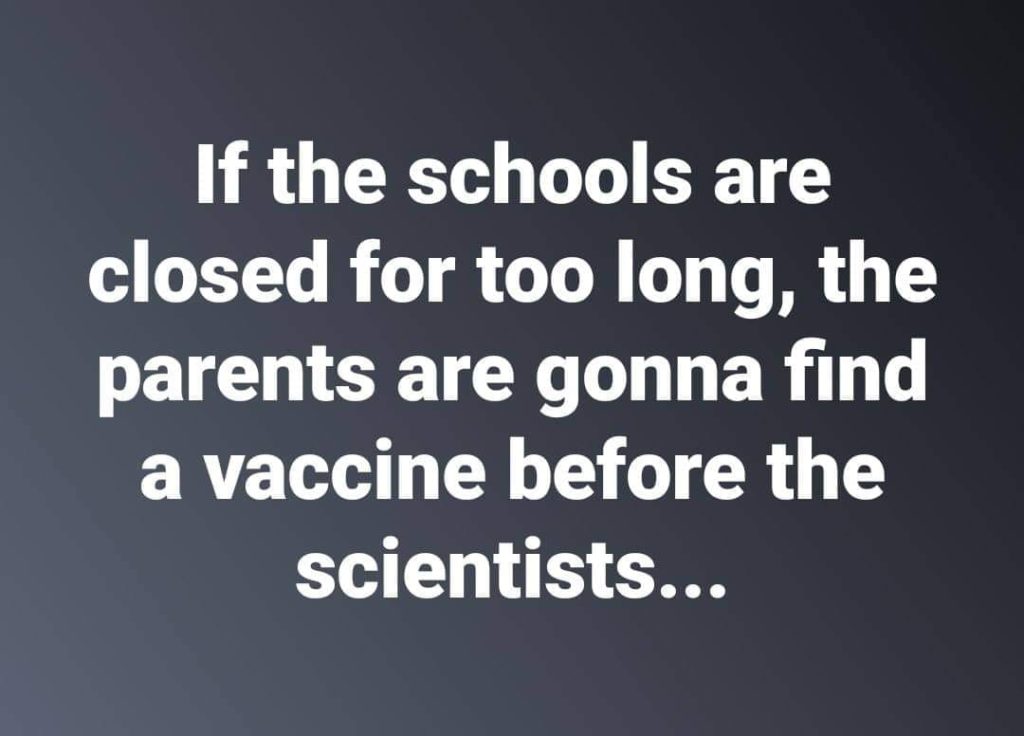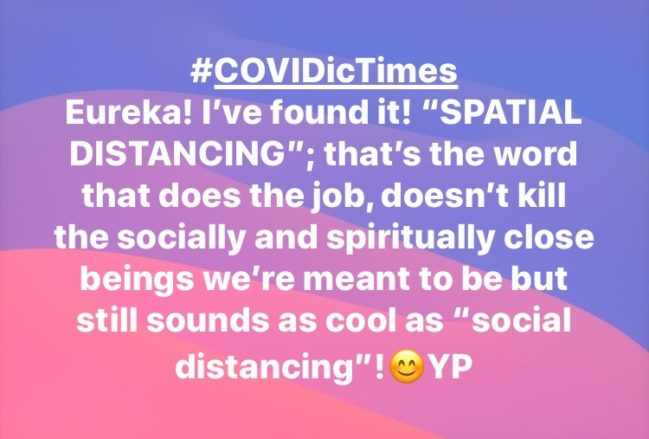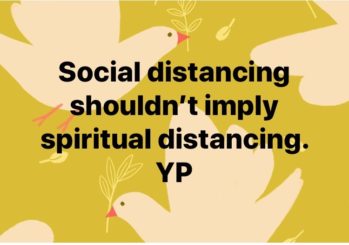COVIDic Times: More Meology Moment.
Almost all of us know more about our fields of study or specialization, from Archeology to Zoology, than we do about ourselves. Most doctors know more medicine than they know themselves; marketers more about brand identity of stuff than they understand about themselves. Why is that? That’s SO wrong!
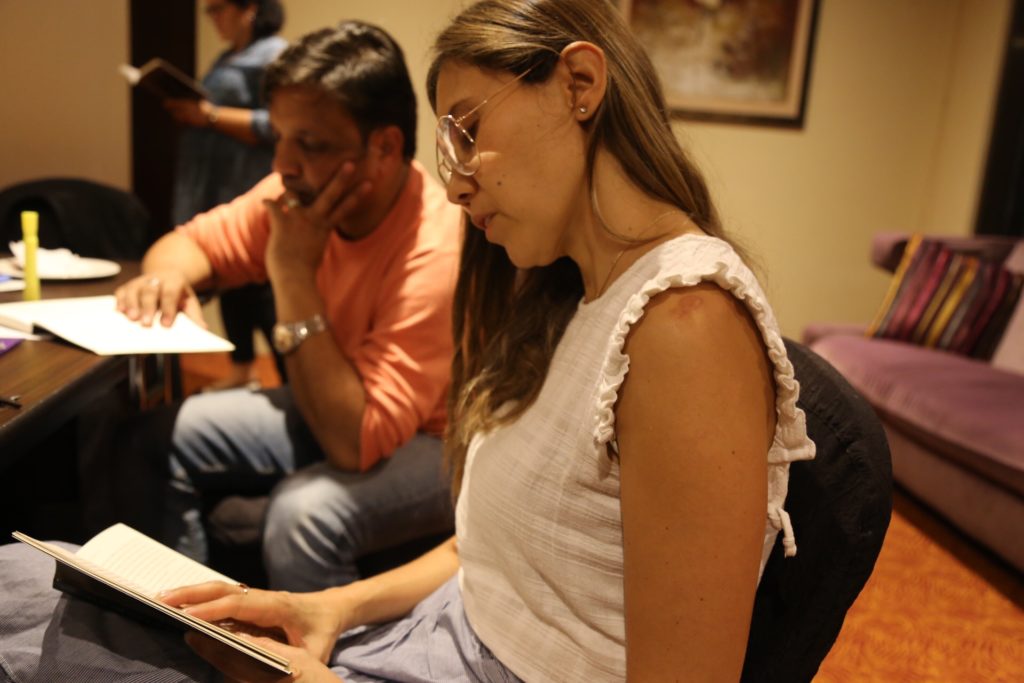
Country CEOs of The HuD Group have been journeying into our own spiritual and emotional health to lead others better (photo credit: The HuD Group)
I recently had a conversation with a 67-year old CEO of a booming business who had never done a personality/behavioural assessment in her entire life! How on earth do most people know more Medicine or Marketing (or whatever their professional field is) than Meology, the study of Me? This blog was provoked by a certain young lady I’ve known for the last 15 years. Between high school and university this gal worked at NEOwarehouse, a book/motivational media store my wife (Anyele) and I owned and run at a busy intersection in Accra, Ghana. All we saw was potential; and over the years she’s proven us right. We saw her leadership blossom as she took a cue from us and began an investment club in her university days and even served as admin. to The HuD Group in Ghana. I was not surprised when she rose through the ranks in the marketing world, working with global brands. Even when she had a stint in the USA while her husband was pursuing his PhD, her entrepreneurial nature led her to pursue one venture after the other, including online merchandising.
Recently she has been a great help with the branding and marketing drive of Perbi Cubs Library Services as we seek to raise a new generation of enlightened people of African descent who are a product of an enviable national culture of leisure reading. To appreciate her for her kind services, pro bono, we rewarded her with a gift of a DISC Personality Indicator assessment. After taking the assessment we were both eager to meet and debrief via Zoom and then I got this email on the morning of, requesting a re-scheduling of the appointment to meet herself. What? Was she not prioritizing this? On the contrary! These were her words: “My goal is to read every page and every word of my report before we meet. Yesterday was super packed for me so I couldn’t finish it. Looking at my day today, I wont have a “quite time” to finish the content and answer the questions before our scheduled time.”
I was so impressed by her commitment to be thorough about knowing her strengths and weaknesses better, her motivations and fears, her best working environments etc. that it provoked this blog. I generally do not see that same zest for Meology as the quest for other arts and sciences! In fact, I dare say that in the last couple of months many of us have even learnt more about a certain Coronavirus than we know about ourselves! Whose idea is that? How on earth does that happen? How could a near-70-year-old have lived that long, had a decent career and be running a profitable company without much Meology. How come that person knows more accounting than their personality?
THE RUSH TO DO & ACHIEVE
When a bunch of nine of us started The HuD Group 17 years ago, we were in our roaring twenties and hungry to shake the world. We were big on mission and purpose. We wanted to help everyone who would listen discover and fulfill their God-given purpose and achieve their full potential. We still do but now we know better, that IDENTITY COMES BEFORE PURPOSE. In fact, who you are is more important than what you do in many ways; but especially who you are totally affects what you do and how you do it. In fact, many of the ancients insisted that we must know ourselves in order to know God.
My friend and sage Carson Pue, demonstrates how self-knowledge and God-knowledge (since we’re made in the image and likeness of God) is the start and core of all true and lasting achievement (see below).
Honestly, a lot of times I cringe when I watch President Donald Trump. He’s achieved what is arguably the highest post on the planet but I wonder how much of himself he isn’t even aware of! These days, there’s a whole field of leadership studies known as Psychodynamics of Leadership. It is becoming clearer and clearer that the best schooling and even being a genius isn’t enough for leadership success that lasts. There is a certain degree of Meology that if not known, blindsides us and strikes us where it hurts most–not just hurts us but all in our circle of influence.
LET’S DISCover
I have been fascinated about meeting me. I don’t make apologies for spending quality time learning about what it means to be a High D and High I, as I discovered a few years ago from taking the DISC assessment. And I’m happy to be giving one of the best gifts anyone could ever give to another human being: the gift of knowing themselves! Every investment of time, money or whatever resource in Meology is worth it, whether you’re as young as our mentee or as old as the post-retirement age CEO.
Taking the DISC is one sure, wise and practical step in this direction. Don’t do life without meeting you; don’t die without ever living! If there is one gift you should give yourself under the quarantine and lockdown circumstances in these COVIDic times it is this: DISCover you. Email me (yawperbi@gmail.com) if you need coaching. I’ll measure how serious you are by only doing it for a fee.
COVIDicTimes: Memories from Prison.
By Sofia Lopez
It’s amazing what quarantines and lockdowns in these times have done. Our mental health is at stake as we live imprisoned behind the walls of our homes. Memories are rife too, good and bad, for good or ill.
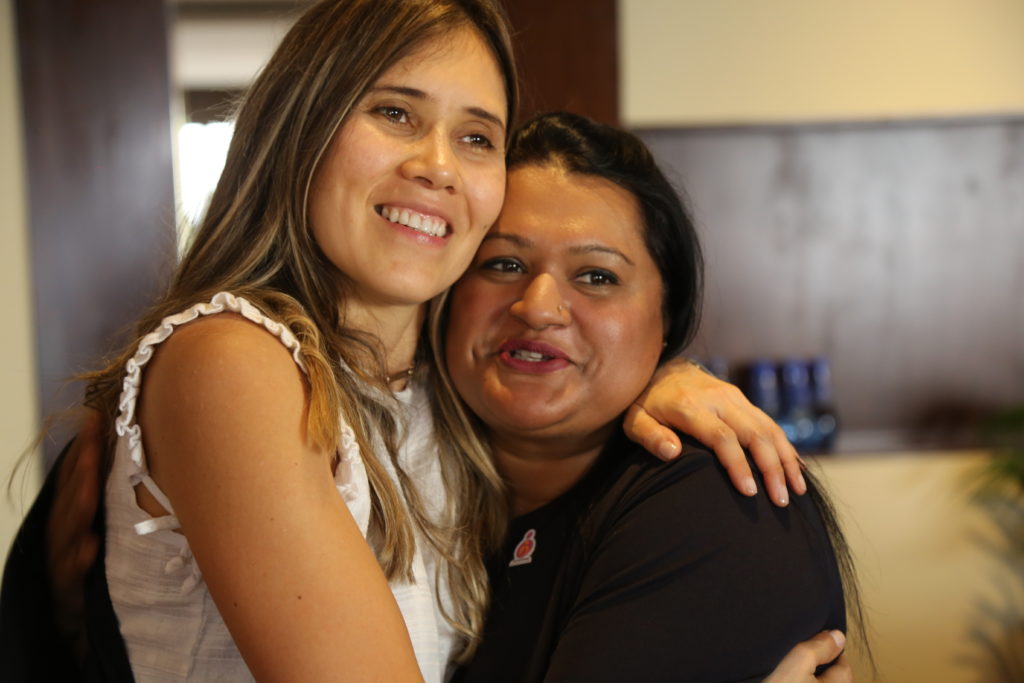
The writer (left) in happier days, when spatial distancing wasn’t an issue (photo credit: The HuD Group)
A true story I want to share with you…
Stepping into the land of the unknown, we entered with our friends into the cold cells of the Taipei International Prison. They were not blasts of cold wind, nor autumn trees shedding flowers everywhere, they were voices of sad eyes, shivering in anguish, talking with their fragile, paper-like gazes.
In the middle of what seemed, at first sight, to be just another concert, Daniel and David, burst into shouts of emotion: “Colombia, Colombia, Colombia”, to the rhythm of my presentation accompanied by a hat and peasant dress.
I wanted to smile, to shout in unison, but the audience and their glances tore my feelings apart, and the strength, with which I had also dressed, had vanished. I knew beforehand that my relationship with Daniel and David, two young Colombians, would be limited to a 30-minute conversation in which we would share a brief greeting, perhaps a couple of experiences but our future dreams, impossible.
Intense moments! Because I wanted to indulge in the passion with which my compatriots and friends were enjoying their last concert in Taiwan. A group of 50 young people from 50 different countries, singing about love, unity and reconciliation. I sang alone with my soul because my voice left me, I think stuck in the flames of my throat, giving everything and nothing with a calm look, wrapped in pine wood and hope.
After the concert, we were allowed to interact. Our conversation was short but very substantial. We broke the ice by talking about our culture, our food, ajiaco and salsa, which would make David, a native of the Valley, smile, and Daniel too, a pure-bred rolo. I listened to their journeys, the stories that had put chains of death on them for their mistakes and their sincere repentance. We talked about their origins, their families and I reserved my questions for perhaps never because there were no seconds to lose in what would be for them the opportunity to speak to a fellow countryman so far from home and in their own language.
We laughed, yes, we laughed, among others, at my espadrilles that did not match the label of the place and for a moment we felt, not in a foreign land, but in the room of our house, enjoying the aroma of a delicious coffee. When the clock threatened to send us away, we embraced each other, like brothers, in a prayer in which we asked God for tranquility and strength in the midst of the designs, those of man and of Him, and I offered my help in whatever I could do for them in Taipei or Colombia. David responded with a clear and determined request: “I want you to call Mom. She thinks I’m traveling the world with my travel bag but she doesn’t know that one mistake will lead me to the harshest of trials in a few weeks”. I wanted to give him some hope with my eyes and I promised to fulfill his wish in the middle of another hug that literally broke my soul.
The International Prison of Taipei, framed the last concert of Daniel and David, the one they enjoyed, listening to a message of love and reconciliation. As I said goodbye, I wondered through the injustice of their misfortunes, their frustrated youth, their unfinished plans and the inevitable misfortune. I compared their lives with mine, and thought that it could also be me or one of my brothers or friends, I thought of the contrasts and paradoxes: Three young people today, in so different situations: One singing hope, others living it.
For a few moments I hated the prison that ended their days and I debated with my conscience the decisions that we humans make about the lives of our brothers, also humans. I assumed that prison is built for others and that it extinguishes hope, dreams, faith and trust.
I said goodbye to Daniel and David with a feeling that sometimes invades us once we set out to help others, but in the end, leaves us in the realm of the favoured. I understood that our prisons are not those built by others to chase away and banish our mistakes, but those that we ourselves build in the imagination to suppress our desires to dream, to fight, to make mistakes, to allow ourselves to be and to accept ourselves as what we are: human.
_______________
Sofia Lopez is the Colombia CEO of The HuD Group. She holds a Masters in International Co-operation and Foreign Relations and has had wide international exposure. She relates the above experience as a World Vision Youth Ambassador (WVYA) nearly 25 years ago. Sofia originally posted this on her Face Book wall. Fellow WVYAs Isobel Bailey (Ireland) and Yaw Perbi (Ghana) edited the English translation for this blog.
COVIDic Times: We really don’t like children that much! | Part 3/3
This final instalment is for those who agree that childbearing and childrearing is hard but worth it, especially in the light of the mission of God. Imagine what earthly contributions of eternal ramifications one could make with a 200-year family vision.

The Von Trapp family of ‘The Sound of Music’ fame. Our family has been called ‘Von Trapp’ more than once (photo credit: Pinterest)
Children are many things we don’t like but they can be real entertainers (remember The Sound of Music? picture above). For us, the Perbis, I often say that in a certain sense we don’t need a TV or even Netflix in our home. We get live Broadway-like shows for free! That’s a bonus; but children are of far more worth than mere entertainment.
In Part 2 of this trilogy, we already established the fact that God wants godly children out of godly marriages to carry out His three-fold mission in every generation. You would think that God chose Abraham, claimed as the father of Judaism, Christianity and Islam, to become a great and powerful people group to accomplish His mission of blessing all nations for some fantastic reasons like his intellect, handsomeness, brute strength, high net worth, aristocratic status or something of the sort but no. God’s reason for choosing Abe is as humbling as is shocking: “I have singled him out so that he will direct his sons and their families to keep the way of the Lord by doing what is right and just. Then I will do for Abraham all that I have promised” (Genesis 18:19, NLT).
We have 16-20 years of intense, direct discipleship of our children in our homes and then another 30-50 years of mentoring (guiding spiritually, coaching, counselling, teaching etc.) them and our grandchildren for the sake of the three-fold mission of God to bring Himself glory through all nations, bring people a blessing and vanquish evil to establish His just kingdom on earth forever. Grandparenting may not be primary and as intense but it is still parenting; only ‘grand’. Our job of raising godly children for the mission of God is not over with our sons and daughters; it continues with their nuclear families too.
MORE THAN MUSIC
We are blessed with two boys and four girls. The other day Anyele and I overheard the children’s conversation about a serious dilemma they were facing. About a year ago when we had five cubs, two boys and three girls, the boys had hoped the next baby was going to be a boy to restore the balance in their parliament (which used to be 2 boys: 2 girls) to 3:3 but alas that was not to be. As they licked their wounds and began to get used to the idea of being outnumbered they even came to the point of the said dilemma regarding the anticipated seventh child: torn between reducing the gender gap to 3:4 with another boy or becoming a mirror of their favourite silver screen family of five gorgeous girls and two ruddy boys: the Von Trapp of The Sound of Music!
That is only a recent conversation so no, the Von Trapps were not our original inspiration to have seven children. I would say we were just inspired by the Lord, independently, to have seven children to advance His mission on earth–and this was before we even got married. Yes, we love children but the number seven seemed especially significant since it’s a ‘perfect number’ or ‘the number of completion’ (as some put it). But then again, so is three. I remember us joking when we had three children: “Honey, this is the other perfect number. We either stop right here or go aaall the way to seven!” As they say, the rest is history.
MORE SIGHT THAN SOUND
Seeing is everything. The greatest teacher who ever lived once said, “Your eye is like a lamp that provides light for your body. When your eye is healthy, your whole body is filled with light. But when it is unhealthy, your body is filled with darkness. Make sure that the light you think you have is not actually darkness“ (Luke 13:35-36, NLT). When I encounter supposed Christian young couples too smart to have children or raise any (adoption, fostering, mentoring are equally legitimate Kingdom-minded options), it leaves me wondering if their ‘enlightenment’ is not actually darkness.
We already dealt with seeing children in terms of our worldview and attitude of the heart in Parts 1 and 2 of this trilogy. The other kinds of seeing I want to touch on here are in terms of focus (what we centre our lives around) and vision (our picture of the future).
WHAT’S YOUR FOCUS?
There are self-focused marriages, spouse-focused marriages, marriage-focused marriages, money-focused marriages, career-focused ones, children-focused marriages and kingdom-focused marriages. The purpose of this series has not been to lead us into children-focused marriages but actually Kingdom-focused ones. Do we wrap our careers and all else around the primary mission of God’s Kingdom or not? Focusing on God’s Kingdom will rightly advance our selves, spouses, marriages, finances, careers, child bearing and rearing for His glory but focusing on these per se first will not necessarily advance the kingdom of God. Why else do you think Jesus said “Seek the Kingdom of God above all else, and live righteously, and he will give you everything you need” (Matthew 6:33, NLT)?
A Kingdom-focused marriage seeks to be an avenue for the fulfillment of the three-fold mission of God to bring himself glory through all nations, bring a blessing to all peoples and vanquishing evil to establish his equitable kingdom on earth forever. What is your family’s contribution going to be?
THE SIGHT OF MISSION
So for Anyele and I, the Sight of Mission, not the Sound of Music, inspires us seven-ward. On our journey, we encountered a paradigm and prayer that deeply challenged and greatly spurred us on: “GOD, WOULD YOU WORK A MIRACLE AND GIVE US SIX FAITHFUL CHILDREN, WHO ON AVERAGE WOULD THEN HAVE SIX FAITHFUL CHILDREN, GENERATION AFTER GENERATION, FOR THE NEXT 200 YEARS?”
In 200 years, according to Rob & Amy Reinow of Vision Family Ministries (assuming 1% of your descendants become pastors, 0.5% missionaries and all your progeny give 10% of their income to advancing the kingdom of God), this should result in:
- 279,936 followers of Jesus Christ
- 2,799 pastors & 1,400 missionaries
- $53,747,520,000 ($54 billion) Kingdom giving.
In 200 years, faithful generations with four children each will result in:
- 16,384 followers of Jesus Christ
- 164 pastors & 82 missionaries
- $4,368,000,000 ($4.4 billion) Kingdom giving.
Do you see the huge difference between six children and four? How about faithful generations with 2 children:
- 128 followers of Jesus Christ
- 1 pastor & 1 missionary
- $50,800,000 ($51 million) Kingdom giving.
Apart from a total of $1.4 million in Kingdom giving, the rest of the math is very ‘ify’ when it’s only one child from generation to generation even for 200 years. Maybe a pastor or missionary some way somehow someday somewhere along the line, perhaps? As for zero children raised… nuff said. Of course, apart from career pastors and missionaries I would hope that every Christ-following child we raise will be missional in their marketplace field of endeavour, from Archaeology to Zoology.
How about faithful families with 8 children generation after generation for 200 years? (see picture below)
CONCLUSION
So you choose. From 1 to 8 children; or more; or none. Anyele and I are praying to God that our seven or more children will result in at least a million Christ followers, some 10,000 pastors and 5,ooo missionaries and at the minimum a quarter of a trillion dollars of Kingdom giving to the glory of God! True, these are all ideal projections. People die early, a handful are barren (no excuse; can still adopt, foster or mentor), some (grand)children walk away from the faith… blah blah blah. I get that. But will the Kingdom of God be worse or better off with your contribution? You be the judge.
A Christ follower makes decisions by seeking God’s mind (through His Word, His Spirit, His people, His circumstantial signs) towards fulfilling his mission. Have you, if you are truly one of His, really asked God HOW MANY, HOW SOON? of are you letting your own conveniences, feelings, secular human philosophy, Planned Parenthood/UNFPA, the economy, school fees, peer pressure, family tradition or whatever else determine that?
If Jesus tarries for the next 200 years, may you and your household have significantly contributed to the teeming number of pastors, missionaries and missional leaders in every field from Archaeology to Zoology to advance His mission on earth, as it is in Heaven. “Those who are wise will shine as bright as the sky, and those who lead many to righteousness will shine like the stars forever” (Daniel 12:3, NLT). Yes it’s qualitative impact and reward, earthly and eternal; but also quantitative.
P.S.
Do you have a family vision and mission statement? Happy to share ours, if you might find it as useful draft/guide for yours.
DEEP MENTORING | A 2020 focus; a lifetime pursuit.
In an April 15, 2020 memo to members, alumni, associates and partners of The HuD Group worldwide through the various country CEOs, the Global CEO bared his heart out regarding a paradigm and practice that is direly needed: deep mentoring.
“So deeply do we care for you that we are determined to share with you not only the gospel of God but also our own selves, because you have become very dear to us.” (1 Thessalonians 2:8, NRSV)
“He [Jesus] appointed twelve that they might be with him and that he might send them out to preach.” (Mark 3:14, NIV)
BY NOW YOU SHOULD KNOW | If you didn’t, now you do.
COVID-19 or not, it is a function of leadership to cast and recast vision—clearly, creatively, constantly. But I dare say particularly in COVIDic times like these, it is suicidal not to cast and recast vision. Every year, The HuD Group runs with a throbbing vision, a focal theme for the season: 2017 (Family First), 2018 (Leading with Health of Soul), 2019 (Pursuing God’s Will Together). In 2020 our focus is Deep Mentoring.
By God’s grace I just finished (in December 2019) a three-year journey resulting in a Master of Arts degree in Global Leadership. One of the key mentors at the institution I studied at, Dr. Bobby Clinton (joined in 1982), after diving into thousands of historical, biblical and contemporary case studies came to a “startling conclusion—few leaders finish well” (Clinton & Stanley 1992, 11). Bad news. The good news, after further studies, showed that of the few who finish well, “other individuals helped most of these men and women in timely situations along the way” (11). But you know the best part? If you’re reading this there’s great hope that you will run your life and leadership well and finish strong because The HuD Group is committed to mentoring; not just mentoring, deep mentoring.
WHAT ON EARTH IS MENTORING? | One of the most used yet least understood words in our generation.
Simply put, mentoring is “a relational experience through which one person empowers another by sharing God-given resources” (12). Christian mentoring, in particular, is “a dynamic, intentional relationship of trust in which a mentor enables a mentee to maximize the grace of God in his or her life through the Holy Spirit, in service of God’s kingdom purposes, by sharing their life, experience and resources” (Lawrence 2004, 207).We have the rest of the year, indeed the rest of our lives, to learn about these different resources and the different types of mentors there are but suffice it to say it is deep mentoring that really matters.
By deep mentoring, we speak of a departure from what Eugene Peterson (writer of The Message version of the Bible) describes as a past half-a-century trend where “leadership … has been functionalized and depersonalized into programs that have steadily eroded the very core of the Christian life, which ought to be a life of trinitarian-shaped intimacy and community” (Reese & Loane 2012, 7, emphasis mine). He says this as part of the foreword to a book, ‘Deep Mentoring,’ which is our main study text alongside the immutable, living and active text of the Bible. While programmes, seminars, courses, workshops, books, videos etc. are all helpful in our discipleship and leadership formation, the essence of deep mentoring is “a leadership of companionship and a spirituality of relationship” (8).
The ultimate example of this is Jesus Christ himself who “appointed twelve that they might be with him and that he might send them out to preach” (Mark 3:14, NIV). A distant second will be the apostle Paul. In our other 2020 Deep Mentoring theme text, can you sense the depth of the relational experience the apostle had with the Thessalonians? “So deeply do we care for you that we are determined to share with you not only the gospel of God but also our own selves, because you have become very dear to us” (1 Thessalonians 2:8, NRSV).
Only deeply transformed people are able to deeply transform the church and the world, by God. I see too many, far too many, untransformed people trying to champion change in the church and/or society. You know too well the names and faces of the countless casualties. People want to ‘microwave’ leaders into being and produce them en mass. It doesn’t work that way—if there ever was a ‘superman’ who could do that it was Jesus yet even he did not because “paying attention to the formation of others is a lifelong work, which holds in tension our growing with our serving—our followership [discipleship] with our leadership” (16, emphasis mine). I am convinced, like the authors of our core textbook for the year, that “leadership development in Jesus’ name is a slow and deep work” (16). We had better get going then—slowly but surely.
CONCLUSION | So what are you going to do about it?
Choose to intentionally journey with your various national HuD Group leaders and their designates poco a poco, day by day, here a little there a little over the course of this whole year (and even another 2-3 years) and see what difference deep mentoring makes in your life and leadership for the sake of God’s kingdom coming more fully on earth, as it is in Heaven!
So help us God! Amen!
References
Clinton, Robert J. & Paul D. Stanley. 1992. Connecting: The Mentoring Relationships You Need to Succeed in Life. Colorado Springs, CO: NavPress.
Lawrence, James. 2004. Growing Leaders: Cultivating Discipleship for Yourself and Others. Peabody, MA: Hendrickson Publishers.
Reese, Randy D. & Robert Loane. 2012. Deep Mentoring: Guiding Others on Their Leadership Journey. Downers Grove, IL: InterVarsity Press.
COVIDic Times: Leading in Times Like These.

If ever leadership was needed it is now. (Photo credit: MIT Sloan Management Review)
John Maxwell stated that “everything rise and fall with leadership”. In order words, when it works, thank leadership. When it fails, hold leadership responsible. What has leadership got to do with COVID-19? Everything actually! Infact COVID-19 is so named because it started in 2019! Guess what? This is April 2020 and our leaders are now running all over the place as if we were not giving adequate time to prepare for a response!
Is this not the attitude that is prevalent in the church as well? As I have stated many times, the current generation of leaders manufacture one product very well without having to built a factory – excuses! This is sadly the legacy being handed over to the younger generation. As a matter of fact, the younger folks have mastered it so well to the chagrin of the older folks.
In the light of this pandemic, how should the younger generation respond and prepare for the future?
- Take responsibility and lead – Leadership is work, not a title and definitely not a position. Several lives have been lost and many may still be lost needlessly because leaders of nations looked the other way when they were supposed to formulate a policy, closed the borders and scrutinize every person who is eventually allowed to enter. If this was done, what should have happened is lockout and NOT lockdown.
- Lead with facts not just emotions – Can you believe that even now many people are still of the opinion that they need not do anything extra to be safe? In fact, there probably are more jokes and video clips out there than there are statistical data that could help curtail this scourge. When it comes to consolidating systems, we quickly get tired and wonder why the stress! We suggest a ‘short cut’, an easier approach, anything that provides without effort. What the short cuts lead to, is a longer journey that we wish we never embarked on.
- Lead together not alone – It is very clear that the only way to deal with this pandemic is for everyone to work together. The days of lone rangers are over and as younger leaders we should quickly recognize the power of togetherness. I have often argued that the work given by God to anyone is usually bigger than what the person can do alone! Why? So that in doing the work together with other people, only God takes the glory.
Kehinde Ojo lives in Abuja, Nigeria. He currently serves as the Program Director of the Indigenous Support Development program of IFES (International Fellowship of Evangelical Students) and also Co-Catalyst of the Ministry Fundraising Network of the Lausanne Movement.
Church in a Century of COVIDic Captivity | Epistle 4
GOD IS AT WORK; LET’S GET TO WORK!
By Julius Duah Coomson
The end product of any masterpiece can hardly be imagined in the midst of the scanty scaffolding on site, seemingly aimless paint strokes on a canvas or meandering strands of textile. But for faith in the genius of the master craftsman one would even pay them no mind; yet just you wait and see!
The events of life can sometimes be like a piece of tapestry. When viewed from the back, it appears like random pieces of thread woven aimlessly together without a design. It is only when viewed from the front that we see the design intended. The COVID-19 situation is no different. Since the world was plagued with the coronavirus pandemic, people have asked me various questions. Some have wondered if God sent this pandemic. Others are at a loss as to why God allowed it. Still, some others are asking why God is not responding to our prayers to stop it. We have a lot of why questions which may never get answered on this side of eternity. However, there is one thing we can be sure about and it is that God is at work even in the midst of this dark situation for His REDEMPTIVE PURPOSES. The reason we can be sure about this is because we have both the promise and examples of scripture to back this.
“FOR THE BIBLE TELLS ME SO”
First, The Promises of Scripture: In Romans 8:28, the apostle Paul tells us that “in all things God works for the good of those who love Him, who have been called according to His purposes.” That is to say, our God works sovereignly in ALL THINGS (good and bad) to bring ultimate good (conformity to Christ; v.29) for His people. This is the promise of Scripture and we can be sure it is true about our present situation. God is at work but often it is only in retrospect that we see that the divine hands have always been working even in the messy situations of life. Even though we may not see His hands, we can trust His heart.
“LOOK AND LIVE”
Second, Examples in Scripture: Not only do we have the promise of God to assure us, but we also have the examples in scripture to encourage us that God is at work even in the darkest of situations to manifest the most glorious of lights. An example of such a situation is the story of the early Church in Acts 8:1-5. The passage can be considered in two main parts:
1. Human Authorities Determined to Silence the Gospel
Verse 1 of Acts 8 begins, “On that day a great persecution broke out against the Church in Jerusalem”. This leads us to ask “on which day?” The answer to this question takes us back to the previous chapter which records the death of Stephen, the first Christian martyr. Now, Acts 6 describes Stephen as a man full of faith and of the Holy Spirit (v.5), full of grace, power, performed great signs and wonders (v.8), was full of wisdom, and persuasively defended the Gospel (v.10). However, when Stephen was lied about, arrested, condemned and stoned, God did not prevent Stephen from dying. Not only did God allow Stephen to die but He also allowed His church to be persecuted. Acts 8:1-3 describes the persecution as great (v.1a), a persecution that scattered the church (v.1b), and a persecution that nearly destroyed the church (v.3). We are not told why God allowed Stephen to die and for persecution to scatter His church, but we learn that God worked to advance His redemptive purpose in the midst of it, which brings me to my second point.
2. God’s Sovereignly advanced the Gospel the Evil Intended
In the minds of the Sanhedrin and the Chief priests, they were quenching the fire of the church by persecuting it but what they eventually did was to spread the fire of the gospel to other places like Samaria (v.5), Cyprus, and Antioch (Acts 11:19-22). They thought they had made the members of the church refugees but little did they know that they were unleashing an army of missionaries for the gospel. It was those who were scattered that “preached the gospel wherever they went” (Acts 8:4). How is it possible that the evil intent of the Sanhedrin resulted in the advancement of the very gospel they wanted to terminate? It was only because God’s hand was with those persecuted, which caused the evil they were going through to serve His redemptive purpose. We read in Acts 11:21 that God’s hand was with them and a great number of people believed and turned to the Lord. Out of a great persecution came a great harvest of souls because God’s hand was at work. Hallelujah!!
Only our God can cause dark situations like these to result in salvation. He is the same God who worked through the wicked schemes of Joseph’s brothers to save the lives of both Jews and Gentiles during the famine in the days of Joseph. Because of God’s sovereign hand, Joseph could say “you meant evil against me, but God meant it for good, in order to bring it about as it is this day, to save many people alive” (Gen. 50:20).
The ultimate example of this is how God used the darkest event in the history of the world; the crucifixion of the righteous, unblemished Son of God-the Lord Jesus Christ to accomplish salvation for the world (Acts 4:27-28). Friends, the God of the Bible is a specialist in working out His redemptive purposes through the dark events of life. Therefore, we can be sure that even in the midst of the COVID-19 pandemic, God is working to advance His redemptive purposes.
“WHAT SHALL WE SAY TO THESE THINGS?”
And so, convinced that God is at work in the midst of our present dark situation, what should our response be? There are three things I would want us to consider. We need to (3Rs):
1. REMIND: ourselves in the midst of this pandemic that, we who belong to the Lord Jesus Christ have what it takes to give people eternal safety far beyond what sanitizers and spatial distancing can accomplish. We need to remind ourselves that not everyone will contract this virus or die from it. However, everyone will spend eternity somewhere and that is a far bigger issue. As believers in Christ, we have the gospel, which is the power of God for salvation for everyone who believes. What we have is able to save the souls of people and give them life beyond this life. This is very important to remind ourselves of. If someone found the cure to the coronavirus and did not share with others, we will say they are wicked. How much more wicked should he/she be considered who ignores sharing the gospel, which can give people everlasting life.
2. RECOGNIZE: that this time of history is a unique opportunity the Lord has put us in so that we can advance the gospel. In these times, many people are asking questions and looking for answers. If we don’t provide true biblical answers, people will take the false ideas being circulated as true. Let’s not forget that nature abhors vacuum and that evil thrives where good people do nothing. Who knows but that we are in Christ for such a time as this? Therefore, recognize the gospel opportunity this pandemic affords.
3. REACH OUT: It is not enough to have the Good News. It must be shared! That is the essence of good news. The Good News is no good news one second after people slip into a Christ-less eternity. Not only must we work hard to ensure we are safe, we must work harder to ensure that people are saved. We can’t be passive about this! We should reach out in good deeds; meeting people’s physical needs. We ought to reach out to people in prayer; praying for the salvation of their souls. We must reach out with the Gospel that Jesus saves and provides Life after this life. Who can you share the good news with? We have shared sanitizers, nose masks, food items and our wealth. Now, it is time to share the Good News.
DO YOU KNOW THE WAY?
Before you attempt to reach out to others with the Good News, you will need to first answer the question of your own relationship with Jesus. Do you have a personal relationship with Him? If you don’t, you can invite Him into your life by praying the prayer below in faith:
Dear Lord Jesus, I acknowledge that I am a sinner but also that you are a great Saviour. I invite you into my life to save me from my sins and to be my Lord. Let the Holy Spirit take residence in me and help me to live the rest of my life for your Glory. Amen.
_______________
Rev. Julius D. Coomson is a pastor with the Legon Interdenominational Church, at the University of Ghana. He holds a Master’s degree from Wheaton. His passion is to see the lost saved and the saved discipled to become committed followers of Christ. Julius lives in Accra with his lovely wife Mawuena and their beautiful daughter Gracey.
COVIDic Times: We really don’t like children that much! | Part 2/3
So what is the paradigm shift we need, a totally different worldview, in order for us to embrace and love children as the ‘blessing’ that they are supposed to be? Those who are too smart to have/raise children will actually soon not be here anymore–and there will be little evidence that they were even ever here. But does this all even matter?
So because children are an inconvenience, suckers, an unwelcome reflection of our marred selves and a host of other pains, many postmodern people would rather have dogs and cats than ‘kids.’ If we do at all, two is the most ‘decent’, ‘smart’ and even ‘cute’ thing to do: “a boy for me and a girl for you, and praise the Lord we’re finally through!” as I heard one preacher humorously quip.
I’ll tell you why Anyele and I have three times the ‘ideal’ (so far) but right from the get go let me be clear what I’m not saying:
- I’m not saying everyone should have seven (or more) children like we plan to. Of course it’s your choice in the light of your calling and circumstances (that is the essence of family planning) but I cannot guarantee that you won’t be inspired to do better than two at the end of this;
- I’m not saying we shouldn’t have economic and ecological considerations of the society or even the earth in mind but I cannot guarantee you won’t drop the silliness being propagated that this world is overpopulated. The whole world’s population can fit into the state of Texas (I know we can argue about arable land, amenities for all etc. but that mathematical fact should shock us to reconsider the lies we’ve bought into);
- I’m not saying biological children is the only way to go. Once we truly understand the purpose of children, including the disabled, we are happy to love on them whether they are from our own womb or not. Even with our blessing of ease of conception, painless labour (did you know that?) and having half a dozen biological cubs already, my dear wife and I still have discussions about the possibility of adopting a couple of children. If you understand the purpose and promise of children you will raise some; even if not yours by biology.
FROM NOTHING TO NOTHING: A SERIES OF NOTHINGNESS
By now you probably know that everyone, irrespective of age or gender, ethnicity or era of history overtly or unconsciously asks themselves these seven questions: 1. Who am I? 2. Where am I from? 3. Why am I here? 4. What can I do? 5. Where am I going? 6. What’s wrong with the world? 7. How can it be fixed?
The answer to each question results in one child, thus our seven. LOL! No; seriously, our answers to these questions is determined by our worldview, which in turn determines how we see children and feel about them. I am happy to debate the (de)merits of postmodern human secularist answers to these questions in a different blog but suffice it to say that they don’t satisfy and are largely to blame for the inconvenience of children. For starters, there’s no God (or if there is he/she/it doesn’t matter) and if I’m just an advanced ape with less hair but more smarts who evolved from amoeba and is heading who knows where then what’s the point of anything, even of life itself, let alone the pain called children?
Who am I? Nothing. Where am I from? Nowhere. Why am I here? No rhyme or reason. Do you have the time for me to go through the remaining questions? Let’s pause briefly on the third question. “This culture basically says that there is no rhyme or reason, so we’re here to make the most of it. Consume. Enjoy. That’s why we’re here. That is the overarching mentality in our culture, both inside and outside the church, resulting in unquenchable materialism and causing us to look at children as a blight and a burden. … Why? Because they get in the way of our consumption and our enjoyment. They cost too much. That’s the fruit of postmodernism and secular humanism” (Voddie Baucham in The Supremacy of Christ in a Postmodern World).
SERIAL DIVORCES
I first speak as a theist; then as a Christian theist. Somehow our generation has managed to divorce God’s mission from our life’s purpose and as Rob Rienow laments, also separated our purpose from marriage, separated marriage from sex, separated sex from children and well… children are left hanging.
In the beginning God created the heavens and the earth and everything in between (Genesis 1:1–it doesn’t get more basic than that). Human beings are not nothing because God created mankind, male and female equally, in His own image and likeness and blessed us. The first thing God ever did for man is to bless us! Wow! We are blessed! And His first instruction to us was: “Be fruitful and increase in number; fill the earth…” We are happy to skip all of this and go to the part that says we should steward the earth, take dominion, lead, even be productive in other ways but don’t want to put first things first! To make babies is man’s first job description.
So why on earth will will Almighty God with bigger and better things to do (have you seen a picture of the Milky Way alone?!) make having children his first priority and man’s first job description, even a couple of thousand years before the 10 commandments? God is on mission to fill the earth with His glory (if you think he’s a megalomaniac feel free to take Him to task about that but remember He made all things and it all belongs to Him including your sharp brain and smart mouth). What the heck has that got do do with human reproduction? Human beings are the crowning glory of His creation! Being God’s image-bearers, every human being brought to life reflects the glory of God and extends it on the earth more and more.
So key is this God-glorifying mission to the Creator that he made marriage of man and woman as the context for this co-creation so that marriage isn’t purposeless, sex isn’t purposeless and the children that result aren’t purposeless either.
SCRIPTURE’S HIGH VIEW OF CHILDREN
Since Jews, Muslims and Christians make up nearly 60% of the world and mainly agree on the Hebrew Bible (a.k.a. ‘Old Testament’), let me just highlight its high view of children throughout: its very beginning (Genesis), middle (Psalms) and the end (Malachi). Of course there are many other places in between but already this blog is much longer than I had intended! (By the way non-religious people, who also tend not to have children (or many children) will be dying out and shrink by 2060. They can keep insulting me for my stupidity of having so many children but they can read the Pew Research here).
Beginning: “God blessed them and said to them, “Be fruitful and increase in number; fill the earth and subdue it…” (Genesis 1:28, emphasis mine)
Middle: “Children are a gift from the LORD; they are a reward from him. Children born to a young man are like arrows in a warrior’s hands. How joyful is the man whose quiver is full of them! He will not be put to shame when he confronts his accusers at the city gates [or when they contend with their opponents in court]” (Psalm 127:3-5, emphasis mine).
End: “Didn’t the LORD make you one with your wife? In body and spirit you are his. And what does he want? Godly children from your union. So guard your heart; remain loyal to the wife of your youth” (Malachi 2:15, emphasis mine).
God’s purpose and plan for godly children from marriage is why the Malachi verse above is followed by the rather strong, “For I hate divorce!” says the LORD, the God of Israel. “To divorce your wife is to overwhelm her with cruelty,” says the LORD of Heaven’s Armies. “So guard your heart; do not be unfaithful to your wife.” (Malachi 2:16). Often that divorce scripture is quoted out of context. What’s so bad about divorce? Well, while God’s heart breaks alright when divorce tears two consenting adults apart (especially for the women 3,000 years ago who had no socioeconomic props unlike now) his sizzling hatred for divorce is actually because of what it does to the children; to His cosmic plan of filling the earth with his image-bearers. They are marred.
Yes, you probably knew Malachi was the last book in the Hebrew Bible but did you realize that the last verse of the last book talks about children too? The LORD speaks of the coming of a certain prophet (who then appears 400 years later in the New Testament) whose preaching “will turn the hearts of fathers to their children, and the hearts of children to their fathers.” Otherwise, disaster (see Malachi 4:15-16). How I pray this blog will turn the hearts of parents to their children and the hearts of children to their parents!
PARADIGM SHIFT: PURPOSE OVER PAIN
A Christian theist view of life gives us purpose greater than the pain of having and rearing children just like many of us when we were in medical students would tell you that the glorious hope of becoming a doctor one day gave us the oomph to make it through a lot of manure in medical school. Purpose over pain. Even for the ‘superman’ Jesus Christ who we just commemorated at Easter barely a week ago, because of the joy awaiting him, he endured the cross, disregarding its pain and shame shame. Now he is seated in the place of honor beside God’s throne. Party forever. We’re to fix our eyes on this pioneer and perfecter of faith (see Hebrews 12:1-2). Purpose over pain.
There are many people who are Christian in name but human secularist in their thinking (particularly the postmodernist kind). Surely this must give cause to “cognitive dissonance.” There are many things we do in life that are hard but we do them. Waking up is hard, taking our bath is hard (be honest! ), growing up is hard, school is hard; sports is hard, marriage is hard (if you don’t think so then you haven’t tried), work is hard, lockdown is hard… (heck, life is hard!) but we do them! Having and raising children is hard too but why separate that hardness from the rest of life? No, we do that too. And if you should ask me, it’s of much more value than most of these other hard things we do. There is a higher Being than our selfish selves that beckons; a higher purpose than the painful inconvenience that compels; and a deeper fulfilment of something (and someone) that outlives making merry today and just dying tomorrow.
Part 3/3 here.
P.S.
Blah Blah blah… Okay, okay we hear you. Children matter. But is how many we have/raise of any consequence: two, seven, a dozen? God-willing, I’ll tell you about a certain 200-year vision and why we want seven.
COVIDic Times: We really don’t like children that much!
This is going to be hard to swallow but it is a call to reexamine our hearts to see how much we really dislike children and why. We may not like to acknowledge it but the stresses and constraints of COVID-19 have exposed us.
“I prefer dogs to children.” Even when we had only two cubs (we don’t call our children “kids”; we’re not goats! lol!) that is an example of the comments made to us while ‘strollering’ our cute (or so we thought) pair on the streets of Montreal and in and out of her subways. One reason we heard for the preference of dogs over children was that “they don’t talk back.” Fair enough.
As you might well imagine, I’m of a different school of thought but at least I appreciate the brutal honesty of those who state it up front that they don’t really fancy children. At least they have integrity–in a weird sort of way. My issue is with those of us who claim we do like, nay love, children but our attitudes and actions betray us. To be honest, there are very few people I’ve met who genuinely love children and this COVID-19 season has exposed it big time.
Have you seen all the jokes going around about children being at home during this Coronavirus season? How much they’re eating at home, how we can’t work because they’re in our space (or even in our hair) and how we can’t wait for schools to reopen so we can dump them there to be quarantined? Some of them are funny (and we must have a sense of humour, come on!) but others are darn right savage.
- Someone said (s)he now understands why some animals eat their young.
- Another, “when do we usually find out who the kids will have for teachers next year? I hope it’s not me again.”
- Yet another, “I now understand why in ancient times some tribes married off their pre-teens.”
According to the World Health Organization, every year in the world there are an estimated 40-50 million abortions. This corresponds to approximately 125,000 abortions per day. At the time of writing this blog that is the total number of people that had died so far in the entire world over four months of this pandemic! Some of us kill children before they’re born; others allow them to live but pay them no mind. At the end of the day is there really a difference that makes the latter group ‘holier than thou’? Most of us are somewhere in between.
In fact, my sense is that for quite a number of us, children are a mere byproduct of sexual pleasure; but for the profound pleasure of sex who would’ve even bothered to go after this hard work of conception, gestation, labour and parenting. By God’s grace, conceiving children and pushing them out hasn’t been a challenge for my wife and I (and we pray for the many for whom this is!) and so she is quick to remind me that that is the easy part. The real hard work is parenting them! And boy is she right.
This is why some of us don’t like children:
1. They inconvenience us
Many of us have a worldview that life is all about us and our enjoyment. The chief goal in life is to be and do whatever we like, however we like it, whenever we like it, with whomever we like it and whatever/whoever else can go to hell. Enter children. Such an inconvenience they are when we want to pursue a career, keep a certain body shape, maintain a certain standard of living… Earlier on I mentioned abortions–that’s basically why we carry them out, kill dem babies. Being a doctor myself I can count on my finger tips how many terminations of pregnancy I have come across that have really been to save a mother’s life! Children mess up with our plans and preferences. Period. We terminate 125,000 of them a day because they cramp our style! As Voddie Baucham succinctly puts it, “they are an inconvenience lump of flesh.” That’s all! Ouch.
Now that I myself managed to dig out a free hour to continue writing this blog (which I began when?…) I can spew out all this ‘nonsense’ you’re reading as if I don’t know children can be an inconvenience until one of them knocks on my door in a moment and ‘disturbs my peace’. And by the way, when I once complained that they knock as if I owe them money; my Facebook friends showed me how grateful I should be that they knock at all! Then I shout, “yeees, who are you!” but what I really mean is “ahaa, whose are you, get outta here!” Before COVID-19 hit, Tuesdays were basically a half-day of work for me. From afternoon to night is all about chauffeuring children from one swim & gym to ballet to basketball 1, basketball 2… Trust me, I know the inconvenience of children.
2. They are suckers
We are consumers; that’s another paradigm. Our chief aim is to consume: have all we can, can all we can and sit on the can. Enter children. They are even more selfish than we are (unless of course we’re still childish). They suck up our time, our money, our energy… who likes suckers?! Such attention-grabbers when we want to be the stars of our own shows (why do we like ‘likes’ on social media?). If it’s any comfort, even Jesus’ disciples didn’t like children! One day parents were bringing their little ones to Jesus for Him to place His hands on them (bless them) and the disciples would have none of that nonsense! Who has time for this, especially a V.I.P. like Jesus! They scolded those who brought them. Oh! But when Jesus saw this, He was upset, indignant, and told them, “Let the little children come to Me, and do not hinder them! For the kingdom of God belongs to such as these.” Then he said children had a lot to teach them, us, and He took the children in His arms, placed His hands on them, and blessed those little suckers. (See story here)
Oh yes it’s expensive to have children. Some of my friends even say school fees is the new birth control! But the other day, I must confess I not only had my eyes wide open but my mouth agape as well as I watched a fascinating TV show about global movements today of people choosing to have no children in the name of saving the future state of the planet. So who’s going to live on it? (I’ll be happy to go to town on this one in a future blog). But yeah, children are suckers. I know. I have half a dozen of them.
3. They reflect us
I won’t forget the day Anyele and I crossed the street to the municipal library across from our home to go and retrieve our cubs from the library. Ordinarily, what’s the big deal about crossing a street except we did it the wrong way. Of course we always tell them to cross at the crosswalk located at the traffic lights but we didn’t; we are parents, above the law. Little did we know that through the huge glass windows of the library they had seen us jaywalking. One reason I won’t forget “the day Anyele and I crossed the street” is because not only did the children ‘give it to us’ (rightly chastise us) they also have reminded us of it a few times since. If you are a parent, you must admit that we often hate in them the very things we find in ourselves. Aren’t they such a reminder that “all have sinned and fall short of the glory of God”?
AND SO…
These are only three of the myriad reasons many of us don’t like children very much. Wishing people more children is about the only ‘blessing’ I’ve seen them actively refuse to say “amen” to! Actually, they reject it in Jesus’ name! So why in the world do I have six of them (so far) and looking forward to one more, DV? I’m not stupid. It takes a completely different worldview. I’ll tell you, DV.
Part 2/3 here.
COVIDic Times: AN EASTER CELEBRATION WITH A DIFFERENCE!
By
Dr. Susie Ubomba-Jaswa
In a matter of a few shorts weeks COVID-19 has totally changed life as we know it in virtually every nation on the globe? What on earth is going on in the world? Is Someone trying to get our attention? Will we heed?
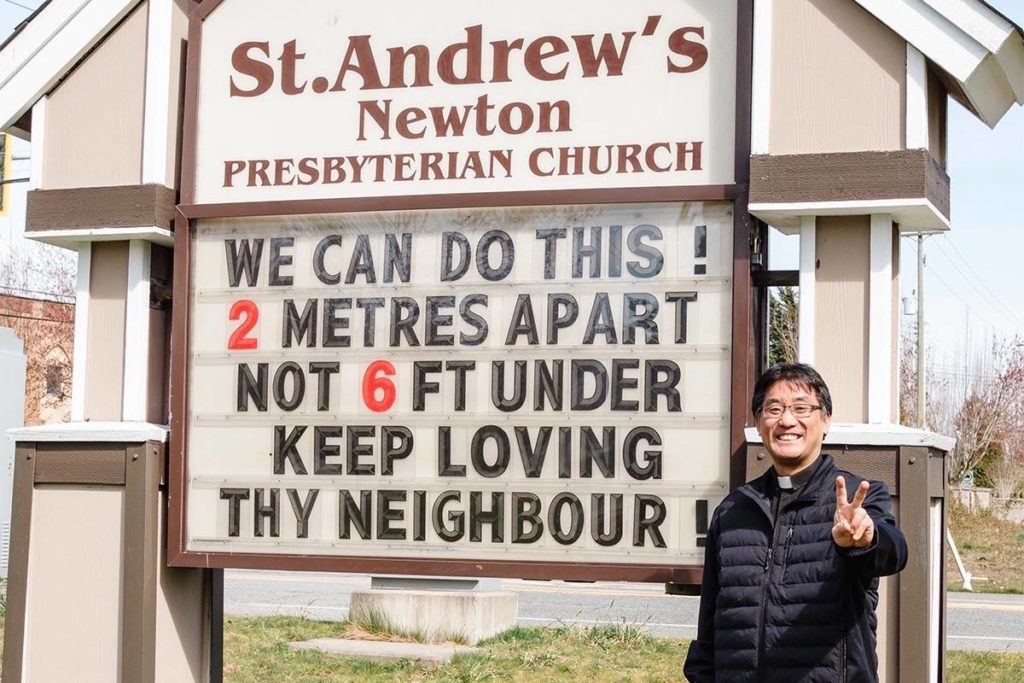
Rev. Geof Jay with one of his many witty COVID-19 related community messages posted in past weeks outside his church in Surrey, BC. (Photo: Olivia R. Jay)
A month ago very few, if any, persons in the world would have imagined or expected this very bizzare, complex, unpleasant global melt down. Within a matter of weeks, the COVID-19 pandemic has essentially changed the health, social, religious, economic, etc. landscape of every nation in the world for the worst.
Previous scarcely used words such as corona, virus, mask, sanitizer, social distancing, self isolation, quarantine, etc. are now on the lips of young and old; rural and urban. Who can even dare mention the current and future positive effects (individuals and organisations that are making and will make millions from the sale of masks, sanitizers, vaccines, all types of supplies, medications, etc.) of this grave pandemic? But clearly the disastrous negative impacts are affecting every individual of the world’s almost 8 billion persons. Even babies born today sadly will not receive the hundred percent joy their parents and relations would ordinarily have welcomed them with. Why? Because the fear and uncertainties at the back of their minds will consciously or otherwise erode some of that happiness. How sad!!!
QUESTIONS GALORE
Naturally the question we are all asking is: what on earth is going on in the world; how come a virus invisible to the naked eye has such a devastating crippling effect on the world with the speed at which people are getting infected and dying? Expectedly a wide range of causes or sources of the infections continue to be spewed all around the world. Thanks to electronic media they move, like the virus, with wild fire.
Whilst the experts are disseminating information about the scientific source and current knowledge of the epidemiology of COVID-19 we are also confronted with tons of messages, videos, pictures, etc. that may be scientific; or not so scientific; half-truths; propaganda, hoax, fake news; etc. Let me try and roughly categorise some of the circulating electronic materials I have read or glanced through:
- Direct plague from God to punish the world: sin is multiplying. Similar to Noah and the Flood; Sodom and Gomorrah; Pharaoh and the Egyptians; Moses and the snakes; numerous plagues mentioned in the Bible.
- The apocalypse: Antichrist; one world religion; second coming of Christ; end of the world.
- Virus transmission: animal to human – from bats, cats, rats, etc.; human to human.
- Laboratory experiments: the effects of scientific experiments horribly gone wrong.
- Biological weapon: deliberate creation of a mild or aggressive biological weapon aimed at specific groups or whole world population.
- Depopulation weapon: deliberate attempt to reduce world population – fertility and destruction of marriage and family life are not too effective hence through morbidity and mortality. For eugenics and environmental reasons.
- Economic: money making; deliberate creation of a disease in order to provide necessary supplies – medical, equipment, etc.
- Technology: creation, testing and use of advanced technologies – complexities of radiation from devices especially 5G and its link to economic, political world power; the reign of artificial intelligence and its impact on the different aspects of human life; insertion of micro chip in humans. Using pandemic as smoke screen.
Where is the truth in all these? The bottom-line is whilst waiting for the truth, if ever we will know it, they are all instilling confusion, anxiety, fear, hopelessness in individuals and governments. In unison we do agree that there is a worldwide disaster. Yes, indeed a world war without guns, bombs and ammunitions and our common enemy, seriously, is a VIRUS!? It is comforting to note that generally people are adhering to the suggested and compulsory measures as individuals and groups to contain and reduce the spread of COVID-19. We salute the health and other workers – paid and voluntary who are at the forefront caring for patients and managing those who succumb to the disease. Very heartbreaking.
BOTTOMLINE
Whether COVID-19 is a plague from God, the end of the world or a man-made catastrophe with distressing effects, a theme that is echoing in personal conversations and variety of electronic messages is that God is speaking; He is trying to get the attention of human beings. Hence in addition to all the numerous beneficial pieces of information we are being reminded of or we are learning from for the first time, I think we should learn some spiritual lessons from and during these perilous times.
Personally I find it fascinating that this global Lockdown is peaking around the time of the christian festival – Easter. Unlike Christmas, Easter tends to produce a solemn, gloomy, sad, mourning ambiance. We all know that the sights of a corpse and the associated settings such as a coffin are heart-shattering. We buried a very good friend of mine a couple of weeks ago!!! And most of us are watching the frightful pictures from China, Iran, Italy, Spain, USA, etc. of the devastation of COVID-19 (even TV reporters tend to give warning to the faint hearted).
We are in the Easter week where we remember Palm Sunday, the Death and Resurrection of our Lord Jesus Christ. Yes, granted, Easter is not celebrated in all countries of the world but for those that do, the celebration of Easter 2020 will be a shocker to all!! Unprecedented in the lifetime of many of us. There will be no physical church services (imagine the empty chapels, cathedrals, auditoriums, tents, parks, etc.); no religious fun fares, parades, retreats, camps, conventions, etc.; no pilgrimages to national and international holy sites; no trooping of visitors particularly to Jerusalem or Rome.
In trying to make sense of it all perhaps as individuals we should also make Easter 2020 unique for ourselves. For many of us we have never read, on our own, at a sitting, the whole Easter story – the last weeks of Jesus on earth. We tend to read pieces on our own and most often from church. Let’s take the challenge – open the Bible and read the passages on the last weeks of Jesus from the Gospels (Matthew, Mark, Luke and John). For those who do not have personal Bibles, you can Google well known versions such as New International Version, from the internet. After all we have lots of time during this lockdown to do some long readings.
I am encouraging us to do this because first, the lockdown has literally forced us to have ample time now. We often indicate we do not have enough time. Secondly, this is an opportunity to read the Easter story on our own, for our self and from the source rather than listening to and reading pieces from other people – religious or otherwise.
We are all asking questions. Even children (at their own level) are conscious of the abnormal situation we live in and are asking questions or reacting to it in their own way. As adults we tend to feel confused, anxious and scared about the present and more so the future. But we are acutely aware that there are more questions than answers bouncing around especially from electronic media. Therefore, my third reason is that this period provides us with some quietness to pause and ponder about serious issues in our lives and fill our minds with some refreshing and trustworthy information from the Bible.
MANY WALKS OF LIFE BUT ONE WAY TO LIFE
Thanks to people like Thomas who do not keep their doubts and uncertainties to themselves but ask questions they genuinely need answers on. For it was in response to Thomas’ question in John 14:5 – “Lord, we don’t know where you are going, so how can we know the way?” that Jesus made one of his profound statements in John 14:6 – “I am the Way and the Truth and the Life. No one comes to the Father except through me”. It is worth noting that Jesus did not say I am the only way trying to caution that there may be possible ways. No! By saying I am the Way, He implied that if you are interested in going to the Father (God), then come through me. If you want to know the truth, then listen to me. And if you are interested in being alive then follow Me.
Why did Jesus call Himself the Way, the Truth and the Life in relation to God? Jesus did that because He is the Saviour (meaning of the name Jesus). His purpose of coming to be born and live on planet earth is to save mankind from what happened with the Devil, Eve, Adam and God’s punishment of death in the Garden of Eden. Why does mankind need a saviour if nothing evil has happened to them? God’s hatred of evil is manifested throughout the Bible with all types of associated punishment. Jesus’ life and teachings highlighted not only the love of God but also the reality of evil (sin – disobedience to God and obedience to the Devil) and its consequences.
It is important to mention that when God drove away Adam and Eve from Eden, He did not take away from them all the blessings He had showered upon them whilst they lived there. They also went away with whatever they gained from eating fruit from the tree of knowledge of good and evil. On top of these they came out with the Death punishment, as a result of obeying the Devil, hanging on them. Therefore, it does not come as a surprise that Jesus’ mission is to bring us back to the Father by DYING for us.
In Jesus we are reminded of what took place in Eden, as well as the provision God made available in order for us to come back to him. To prove the truth that God still loves mankind and has provided forgiveness for us through Jesus’ dying on the Cross, God gave His life back by RAISING Him from the dead. Since God did not take away human beings’ ability to choose, Jesus declares in the well known verses, “For God so loved the world that He gave His only Son, that whoever believes in Him shall not perish but have eternal life. For God did not send His Son into the world to condemn the world (mankind was already condemned in Eden), but to save the world through Him” (John 3:16&17).
The Easter story makes good sense of Jesus’ claim that He is the Way, the Truth and the Life. The way back to the Father; the truth regarding sin and its consequences, provision of forgiveness through Jesus’ death; and the life He gave through His resurrection that indeed we were created to live forever with the Father. This is the Good News of God, the Gospel, that has over the centuries been shared and received globally by many from all walks of life. The spread and acceptance of the salvation of Jesus Christ is unstoppable all over the world. Likewise, the indifference towards and rejection of who Jesus is and His purpose of coming into the world also persist.
BRINGING IT HOME
From your deepest thoughts are you able to genuinely answer the question – which camp do you belong to? Referring to John 3:16 are you in the Eternal Life group or the Perish group? Praise the Lord if you are in the first group. Jesus’ teachings encourage those who choose Him to continue travelling on the Narrow way because at the end of it is Life (Heaven). On the other hand, those who do not choose Him (i.e. are indifferent or reject Him) are on the Broad way that leads to Destruction (Hell). One of the unique characteristics that runs through Jesus’ teaching on salvation is the fact that He always deals with two groups of people – this binary approach makes His teaching clear and not ambiguous. There is no sitting on the fence. You are either His follower or you are not. Why only two groups? Because Adam and Eve put all of us on the Broad way. Acceptance of Jesus takes us from the Broad way to the Narrow one.
In case you are not on the Narrow way, know that it is not late to leave the Broad way and join us on the Narrow way. The Easter message is that on Good Friday, Jesus died on the Cross to pay for our sin (disobedience to God) so that we can go back to God. He proved it on Easter Sunday through His resurrection from the dead that indeed there is forgiveness available for those who want to come back to the Father. One of the comforting sayings of Jesus is Luke 5:32 – “It is not the healthy who need a doctor, but the sick. I have not come to call the righteous, but sinners to repentance.” God the Father and Jesus Christ have played their part. As a person, I have to play my part by accepting the offer they give me – Jesus, the Way back to God.
Sometimes we wish that the Father will force all human beings to come to Him through the salvation He has provided in His Son. But that is not the case. He wants us to freely come to Him just as we are. He is waiting. The invitation is open until a person dies. So where do you want to spend life after your physical death – with the Father or with the Devil? Once again Jesus does not leave us guessing. He clearly teaches that Hell was created for the Devil and those who choose to obey and follow him.
The arrival of COVID-19 has shaken the world and vividly revealed how precarious our existence can be. Interestingly, Jesus extensively taught about the temporary nature of life on earth not only for individuals but for the whole of creation. He also taught about His second coming and the end of the world. And even though He did not give a date of His return or the end of the world His teachings provide several signs and pointers and tend to be intricately woven together and often referred to as the Apocalypse. The suddenness, the destruction and the sheer global impact of COVID-19 on all aspects of our daily lives have awakened up humanity.
Despite the uncertainties brought about by this pandemic, one thing we are assured of is that Jesus’ invitation still stands. His voice is not locked down. And the celebration of Easter (without all the relevant and not so relevant associated rituals) is once again reminding us of the demonstration of God’s love in calling us to leave the Broad way that leads to Hell and come to Him through the salvation He has provided in Jesus.
For those who have believed in Jesus and accepted Him as our Lord and Saviour, He is encouraging us to continue trusting in Him because He is the Truth. We should not let the fear of the unknown future – persecutions, pandemics, wars (physical, biological chemical, spiritual, etc.), new world order, one world religion, artificial intelligent god and church, negative effects of technology, increase of evil, rule of the Antichrist, Jesus’ second return, end of the world, etc. – overwhelm us and derail us from travelling on the Narrow way. We have chosen Eternal Life with the Father which Jesus explains to Martha and us in John 11:25&26, “I am the resurrection and the life; he who believes in Me will live, even though he dies. And everyone who lives and believes in Me will live, even though he dies”.
May we have a refreshing time with Jesus as we journey with Him to the Cross and up from the Grave to bring us Eternal Life.
_______________
The author holds a PhD degree in Medical Demography. She taught Demography, Research Methodology and Statistics in universities in Ghana and South Africa. She also worked for the South African civil service as a director in Health and Vital Statistics where she retired from. She is married with adult children and grand children. Susie committed her life to Jesus Christ as a teenager through the ministry of Scripture Union, Ghana.
COVIDic Times: SPATIAL DISTANCING; NOT SOCIAL.
We all know what is meant by the most popular phrase in the universe right now, ‘social distancing,’ but the term is unacceptable to me on at least three levels. I would rather go for the term ‘spatial distancing’ than ‘social distancing,’ and here’s why.
The world is in wartime mode, fighting a pandemic that hasn’t spared any country or territory on the globe and so this is not the moment to be squabbling over words. But for what it’s worth let me get this ‘social’ versus ‘spatial’ debate off my chest!
The COVID-19 formula to contain the pandemic locally and to ‘flatten the curve’ globally has mainly been hand washing (or sanitizing), masking up (depending on who you listen to) and ‘social distancing.’ The latter has meant anything from being six feet away from your neighbour to simply staying at home.
While the mode of transmission of the SARS-CoV-2 virus calls for such a physical distancing from one another in order not to contract the disease or infect others (if you already have it) my problem with the term ‘social distancing’ is three-fold.
1. THE SOCIOLOGICAL FAUX PAS
First of all, we are social beings. We all know ‘No man is an island,’ a popular quote from the English metaphysical poet John Donne (1572-1631). Distancing ourselves from one another at anytime has harmful consequences let alone at such a time as this. My friends on Face Book and I, knowing what was meant by ‘social distancing’ yet unhappy with what it connotes, began this discussion a couple of weeks ago and tried to find another term. We initially landed on ‘physical distancing’ which is as clear as day yet doesn’t have the same ring to it as ‘social distancing.’ As succinctly put by Nana Efua, “‘social distancing’ sounds more hip.” Theo Aryee even went ahead to take screenshots of dictionary definitions of physical (“relating to the body as opposed to the mind”/”involving bodily contact or activity”) and social (“relating to society or its organization”/”needing companionship and therefore be suited to living in communities”) for comparison online.
Some don’t mind the term ‘social distancing’; it’s no big deal to them. As Esi put it, “I personally don’t see the fuss… When in SOCIAL contexts, (as in, when with other human beings), keep your distance. “Same Difference”, and since the memo has been circulated already, we might as well not muddy the waters.” I was pleased to read in the Los Angeles Times that those of us fussing on Face Book were not alone. In an article entitled “Isolation is hazardous to your health. The term ‘social distancing’ doesn’t help,” the staff writer refers to a professor at Northeastern University in Boston, Daniel Aldrich, who says, “The moment I heard public health authorities use the term, I thought they were making a mistake.” I was pleased to read that his preference, like my friends and I, was “physical distancing.”
“Aldrich fears the phrase “social distancing” suggests we should be turning inward and closing ourselves off from friends and neighbors in the outside world.” I concur. He hits the nail right on the head: “That’s the exact opposite of what we want people to do. You need to have as close social ties as possible when physical distancing is in effect.” As a medical doctor I know social connections affect many socioeconomic and health indicators and from Aldrich’s own post-disaster studies, actually directly affect death rates.
2. THE ANTHROPOLOGICAL FAUX PAS
I find the anti ‘social distancing’ reaction of experts from a generally individualistic Western society intriguing as anthropologically, they are more likely to come up with a term like that. For the West, especially since the Enlightenment with its “I think therefore I am” movement, autonomy and individualism are rife. As someone born and raised in the global south, where to be is to be in community, I would say if ‘social distancing’ sounds bad to a Westerner then it’s anathema to the Majority World.
For the Global North, generally, I am because I think; for the rest, I am because we are. The South African Bantu term Ubuntu, to wit “I am because you are,” encapsulates the idea that humans cannot exist in isolation. There is no personhood without the other and we depend on community connection, conversation and caring. For honor-shame cultures, which two-thirds of the world is, social distancing is synonymous with having a cause for shame. If you consider Archbishop Desmond Tutu’s definition of ubuntu in his 1999 book you will see how it’s the exact opposite of ‘social distancing’: “A person with Ubuntu is open and available to others, affirming of others, does not feel threatened that others are able and good, based from a proper self-assurance that comes from knowing that he or she belongs in a greater whole and is diminished when others are humiliated or diminished, when others are tortured or oppressed.”
3. THE THEOLOGICAL FAUX PAS
Finally as a Christ-follower, and a pastor at that, I always try to theologically reflect on the words, terms and concepts I use. ‘Social distancing’ (again while we all know what is meant) wouldn’t cut it theologically. The nature of the Triune God—one-in-three, three-in-one—of the Christian faith, as argued by Tertullian (c.155-220 A.D.) of Tunisia, is that “from all eternity God is one, but God is not alone.” Right from Genesis 1:1, Elohim (the Hebrew word for God) is a plural noun, most explicitly seen in Genesis 1:26 where God says, “Let us make humanity in our image, according to our likeness.” As another theologian put it, “at the centre of the universe is a relationship.” At the centre of the universe is a community: Father, Son and Holy Spirit.
Since this article is not an apologetic for the Trinity, suffice it to say that mankind having been made in the image and likeness of the Triune God who is himself relationship, family, community and social, cannot be ‘socially distant’ and remain human. In the above March 18, 2020 Facebook post I wanted to sound a caution, especially since churches were at the cusp of being forced to close for physical meetings, that the last thing anyone should do at this time is to lose not only the horizontal relationship with each other (as explained in the first two points above) but also the vertical relationship with God as well. God’s family, the ‘household of faith,’ is not referred to as ‘the body of Christ’ for nothing. There can be no social or spiritual distancing of any of the body parts.
CONCLUSION
So it was with utmost excitement on the eve of April Fool’s day that I posted the following on my Face Book wall (which has suffered a lot of graffiti since the COVID-19 broke out): “Eureka! I’ve found it! “SPACIAL DISTANCING”; that’s the word that does the job, doesn’t kill the socially and spiritually close beings we’re meant to be but still sounds as cool as “social distancing”!”
I’m on a personal campaign to kill ‘social distancing’ and replace it with ‘spacial distancing.’ Human beings can afford to be physically distant for a season but die in more ways than one when we become socially and spiritually distant, even for a brief moment. Off to keep up the fight with clean hands against the Coronavirus; spacial distancing it is while at it. Selah.


